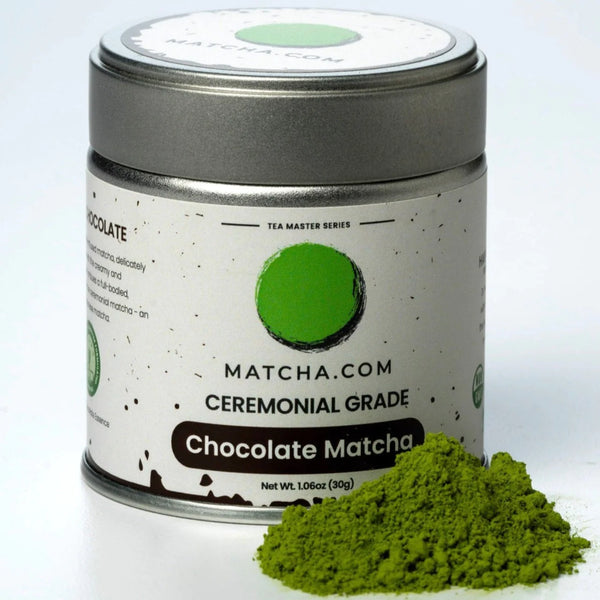Some pairings just make sense: peanut butter and jelly, sea salt and caramel... and yes, matcha and dark chocolate.
This one’s more than just a flavor match, it’s a functional duo loaded with powerful antioxidants that can support your focus, heart health, digestion, and mood. Both ingredients have been studied for their protective benefits, and when you bring them together? You get a smart, delicious way to boost your wellness routine.

1. Double the antioxidants, double the fun
Matcha and dark chocolate are both rich in antioxidants, but they bring different compounds to the table.
-
Matcha is packed with catechins, especially EGCG (epigallocatechin gallate), a potent antioxidant linked to cardiovascular and cognitive benefits.
-
Dark chocolate is high in flavanols, which help support blood flow, cellular health, and reduce oxidative stress.
Together, they work to:
-
Protect cells from free radical damage
-
Reduce inflammation in the body
-
Support long term heart and brain health
2. Energy and focus without the crash
This duo offers clean, focused energy that’s perfect for a midday pick-me-up.
-
Matcha delivers moderate caffeine (an average of around 70g per serving) and L-theanine, which promotes calm, focused, alertness.
-
Dark chocolate adds a bit of caffeine and theobromine, a gentle stimulant that supports mental clarity.
Together, they provide:
-
Improved focus
-
Fewer crashes or anxious jitters compared to coffee

3. Mood boosting benefits
Both matcha and dark chocolate support a better mood naturally.
-
Dark chocolate contains compounds like PEA (phenylethylamine) and anandamide, known to promote a sense of pleasure and happiness.
-
Matcha’s L-theanine has calming properties and helps ease daily stress.
This pairing offers a moment of calm and clarity without feeling heavy or overly indulgent.
4. Gut and metabolic support
While they’re often thought of as sweet treats, matcha and dark chocolate both support digestion and metabolism - especially when consumed in moderation.
-
Matcha contains polyphenols and trace fiber that may help support beneficial gut bacteria and ramp up your metabolism.
-
Dark chocolate (especially at 70% cacao or higher) can improve insulin sensitivity and also support gut microbiome diversity.
When paired:
-
You can experience less bloating
-
Better digestion after meals
-
More stable energy and blood sugar

5. A delicious, antioxidant-packed treat
The best part? You don’t need a complicated recipe to enjoy this pairing plus you can easily sub dark chocolate into any recipe that calls for milk or white chocolate.
Easy ways to try matcha and dark chocolate together:
-
Dark chocolate bark dusted with matcha
-
Matcha energy bites with dark chocolate chips
-
A square of 85% dark chocolate with an iced matcha latte
-
Smashed matcha chocolate dates
-
Matcha chocolate chip oatmeal cookies
The bottom line
Matcha and dark chocolate are antioxidant rich superfoods that work better together. They support energy, digestion, brain function, heart health, and mood all while satisfying your sweet tooth in a balanced, nourishing way.
Disclaimer: These statements in this blog post have not been evaluated by the Food and Drug Administration. The information provided here is for educational purposes only and should not be considered as medical advice. It's essential to consult with a qualified healthcare professional before making any dietary or lifestyle changes.
Resources:
Katz, D. L., Doughty, K., & Ali, A. (2011). Cocoa and chocolate in human health and disease. Antioxidants & redox signaling, 15(10), 2779–2811. https://doi.org/10.1089/ars.2010.3697
Jakubczyk, K., Kochman, J., Kwiatkowska, A., Kałduńska, J., Dec, K., Kawczuga, D., & Janda, K. (2020). Antioxidant Properties and Nutritional Composition of Matcha Green Tea. Foods (Basel, Switzerland), 9(4), 483. https://doi.org/10.3390/foods9040483
Sokolov, A. N., Pavlova, M. A., Klosterhalfen, S., & Enck, P. (2013). Chocolate and the brain: neurobiological impact of cocoa flavanols on cognition and behavior. Neuroscience and biobehavioral reviews, 37(10 Pt 2), 2445–2453. https://doi.org/10.1016/j.neubiorev.2013.06.013
Nobre, A. C., Rao, A., & Owen, G. N. (2008). L-theanine, a natural constituent in tea, and its effect on mental state. Asia Pacific journal of clinical nutrition, 17 Suppl 1, 167–168.https://pubmed.ncbi.nlm.nih.gov/18296328/







